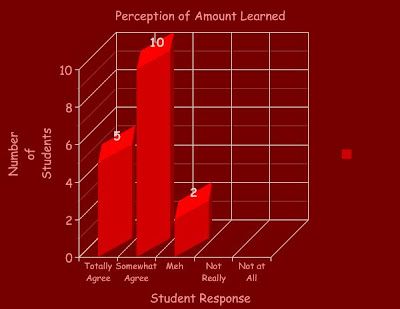In order for me to learn and grow as a teacher, I need meaningful feedback as well. This is often difficult to get. Test scores aren't the best measure of what's important in school, so it would be silly for me to use them as a self-reflection tool.
With that in mind, I asked my students to spend a few minutes filling out a five question survey yesterday. Since I stressed to my students that the survey was totally anonymous and that I wanted them to be brutally honest, I was a bit anxious to see the results.
Here's what I found:
Question #1 - Do you agree with the following statement?
I enjoy learning more than I did before this school year started.
Question #2 - Do you agree with the following statement?
I've learned a lot so far this year.
Question #4 - What are some things Mr. Soskil can do better during the second half of the year to make it easier for you to learn?
Question #5 - What are some things that you (student) can do better during the second half of the year to make it easier for you to learn?
My reactions:
- I'm disappointed by the number of students who are not enjoying learning more than in the past. Increasing love of learning is one of my top goals. I need to focus on this more.
- I'm happy that my students feel that they are learning a lot. I agree with them. I've seen amazing growth in all of them. I purposefully didn't include any clarification on what has been learned. As long as they are learning, I'm happy.
- This is my first year having my students blog. I'm sold. It was the number one response when listing the things we've done that have made it easier to learn. I see that they are motivated to learn new things so that they have material to blog about, and I see that they are becoming better writers as they continue sharing that learning.
- The words "explaining" and "explanation" came up a lot in many of my students' responses. I see that as a possible red flag that they still view me as the person who gives them information. They learned more because I explained things more to them and want even more explanation of things going forward. I worry that I'm not passing the control of their learning over to them as much as I had hoped I would.
- On the other hand, many of them see that they need to seek information on their own in order to be more successful during the second half of the year. That's encouraging.
- Many students' self-reflection responses ("pay attention more", "stop talking") tell me that I still have work to do in convinving them that learning isn't about sitting in one's seat and listening to the teacher. I know that this group has difficulty listening to anyone who is talking, even when collaborating with others for a common purpose. I'm hoping their responses are more about the issues when collaborating, but I doubt it.




